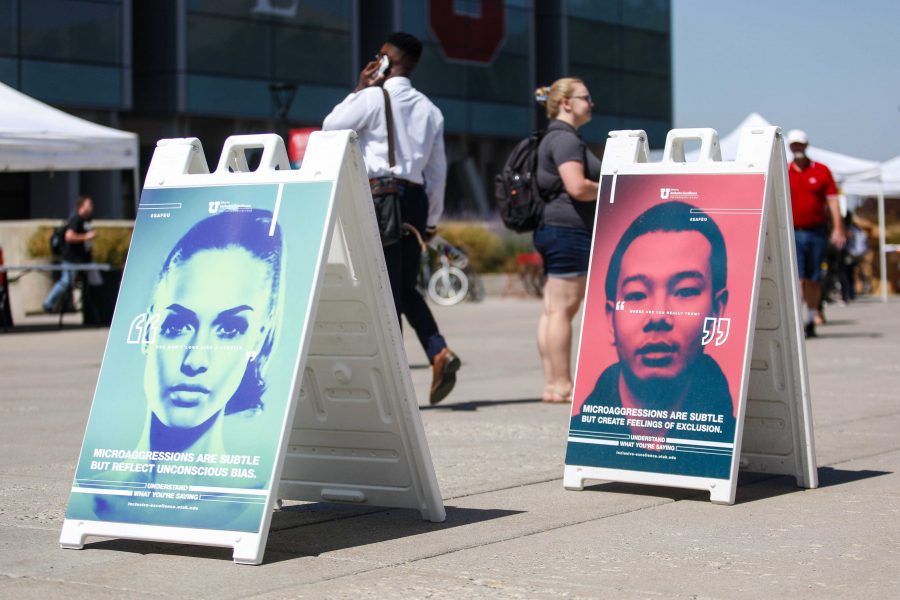Since late August, posters have lined the courtyard of the Marriot Library. Each shows a face and a phrase. “Where are you really from?” asks one. “You’re pretty for a dark-skin girl,” reads another. Each poster displays an example of a microaggression. Microaggressions are defined by Columbia University education and psychology professor Derald Wing Sue in his book Microaggressions in Everyday Life as “constant and continuing reality of slights, insults, invalidations and indignities visited upon marginalized groups by well-intentioned, moral and decent family members, friends, neighbors, coworkers, students, teachers, clerks, waiters and waitresses, employers, health care professionals and educators.” Designed by University of Utah graphic designer Jason Jiang, the posters received the University and College Designers Association 2018 Excellence Award.
“This project gave me the opportunity to do something I truly believe will make a difference,” Jiang told @theU. “It’s really fun to work on something that I believe will make campus safer and promote a friendlier environment where students can come to have fun and get a good education.”
Also featured on the poster is the hashtag #SAFEU. The SafeU campaign was launched in 2017 by the Presidential Task Force on Campus Safety. The task force was created after the 2016 election when problems with microaggressions and hate crimes rose on college campuses across the nation, which included the posting of racist flyers at the U in August 2017.
That same month, the U published a letter to students reading, “There is simply no place for violence or hate on this campus. We condemn all hateful, bigoted, racist and violent acts and words in the strongest possible terms. Our response to these despicable acts and words will be to call them what they are, and we encourage you, too, to speak up loudly against them. The appearance of two racist posters, which specifically impacted black members of our campus community, horrified us and revealed that our current protocols for communicating with the campus about acts of bigotry and racism must be more immediate.”
The SafeU campaign focuses on issues such as bias to promote a safe learning environment for all students.
Ana Carolina Antunes, an instructor of gender and social change at the U, paints the picture with the image of a birdcage to her class.
As an outsider, you may see a bird simply standing behind a single bar, she explains. Why is the bird so upset? Why does the bird not just fly around the bar? When you back up and look at the big picture, there are so many bars that there is no way the bird could escape.
In this analogy, each sly and degrading comment made toward another is a bar in the way, trapping the subject into feeling like they do not belong.
“It feels much more welcoming when people start by assuming that we belong here,” said Belinda Otukolo Saltiban, the director of the U’s Office for Inclusive Excellence, in an interview with @theU. “The goal in raising awareness around this issue is simply to recognize what microaggressions are, better understand how they impact others and promote respectful and productive dialogue around the topic.”
Over the years, the Office for Inclusive Excellence, which is in charge of promoting a community where all students feel as though they belong, has received an influx of incident reports. The office decided it was time to take action.
These posters are only the first step. During the fall 2018 semester, the Office for Inclusive Excellence will hold a panel discussion focusing on microaggressions.
In an effort to cultivate respect, the U offers workshops every other week.
“As members of the campus community we all need to have the knowledge to identify microaggressions, explore the role they play on campus and know how to respond when a microaggression occurs,” reads the event description.
Learning objectives listed are, “To gain a basic understanding of bias and microaggressions, to better understand the impact of microaggressions on individuals and its relationship to campus climate, to explore strategies toward minimizing the negative impact of microaggressions.”
The event is open to 30 people and is usually held in the Annex building, room 151, wing D.
According to the American Psychological Association, the list of possible microaggressions is vast. Some common racial microaggressions include when white people claim to be color-blind when it comes to race issues, support meritocracy, say that America should be a melting pot and when they ask non-white individuals where they were born.
“A crucial contributing factor to a more inclusive campus culture starts with self-awareness,” said assistant director of the Office for Inclusive Excellence Jude McNeil to @theU. “Many of us, including myself, have made unintentional microaggressive remarks that have hurt other people. It is important, however, to listen to feedback and be willing to make adjustments. Sometimes a small change can have a huge impact on others.”
There is a webpage available, inclusive-excellence.utah.edu/report-form.php, for students or staff to submit complaints regarding discrimination or sexual harassment. Incident reports are used by the Office for Inclusive Excellence to assess the climate of the campus and figure out ways to better educate the U. The Office for Inclusive Excellence then forwards reports to University Police and the Office of Equal Opportunity and Affirmative Action for a follow-up. The only required field on the report is email, which can also be kept anonymous by filling the field with [email protected].
“All reports will be confidential to the extent permitted by the laws, university policies and its core values,” reads the site.


